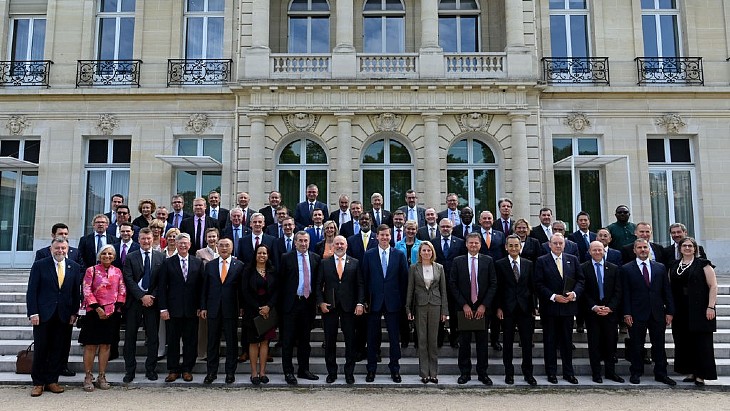On the industry side, the Canadian Nuclear Association, the Candu Owners Group Inc, Gifen, Japan Atomic Industrial Forum, Korea Atomic Industrial Forum, Nuclear Energy Institute, nucleareurope, Nuclear Industry Association and World Nuclear Association issued a communiqué saying: "We recognise that we are at a critical juncture in terms of climate and energy security, and nuclear energy must play an essential role - alongside other clean energy technologies - if we are to meet this moment. The urgency and magnitude of the challenge before us is real and the speed and scale of the response must match this task."
"Building on the collaboration in April in Sapporo, Japan, during the G7 Climate, Energy and Environment Ministers meeting and Business Forum, we stand ready to work together with policymakers to rebuild leadership in nuclear energy within OECD countries and to cooperate with other like-minded nations as they seek to meet their climate and energy security goals."
They pledge to work with governments to:
- Extend the operating period of existing nuclear generation resources for as long as is feasible. This includes supporting the restart of operable reactors and encouraging efficient safety reviews
- Drive rapid and significant reductions in construction costs and timelines of nuclear energy by leveraging lessons learned from recent nuclear new-build projects
- Accelerate the deployment of small modular reactors and advanced reactors, alongside large nuclear reactors, to unlock large-scale deployment in the 2030s and support decarbonisation of hard-to-abate sectors
- Deepen international cooperation for the development of the nuclear supply chain and its workforce and to explore options to better ensure capabilities and resources in key strategic areas
- Develop nuclear fuel supply chain capacity and promote cooperation with likeminded nations who seek to end reliance on civil nuclear fuel and related goods from nations that present ongoing geopolitical threats to energy security
- Advance sustainability principles including the circular economy in the nuclear sector through responsible use of nuclear technology and life-cycle management of nuclear materials
- Promote an inclusive and diverse nuclear industry, including in the areas of gender diversity, building on the 2023 OECD Recommendation on Improving the Gender Balance in the Nuclear Sector
They call on policymakers to "foster a financial environment that promotes investment in nuclear energy" and on regulators to modernise regulatory frameworks to "license nuclear technologies efficiently" and to increase cooperation to reduce "regulatory barriers to deployment of technologies in multiple countries". They also urge governments to "develop technology-neutral climate policies in which nuclear energy is fairly compensated for its low-carbon, resilience and reliability value".
Ahead of the 28th Conference of the Parties (COP28) they call for the event to "take action to ensure we succeed in meeting our collective climate goals and to recognise the important role that nuclear energy will play in meeting these goals".
A separate communiqué was issued by the energy ministers and heads of delegation of Bulgaria, Canada, Czech Republic, Estonia, Finland, France, Ghana, Hungary, Japan, Korea, Poland, Romania, Netherlands, Slovakia, Slovenia, Sweden, Turkey, Ukraine, the UK and the USA, saying that "nuclear energy already plays a significant role in meeting climate goals and can play an even larger role in achieving global net zero emissions by 2050, consistent with the 1.5°C scenario and with the Paris Agreement".
It calls for extending the operation of existing nuclear power plants and "large-scale deployment of new nuclear power plants" and says "securing the needed increase in global nuclear energy will require strategic international collaboration among like-minded governments as well as public-private partnerships and industry leadership".
They issue a "call to action" ahead of COP28, which begins in Dubai at the end of November, to explore innovative financial approaches for funding and for "greater inclusion of nuclear energy in the environmental, social and governance policies in the international financial system considering that it is one of the zero and low-emissions sources of power generation that can contribute substantially to climate change mitigation".
The countries say they are committed to "fostering international collaboration" to "support the creation and maintenance of enabling policy frameworks, regulatory pathways, and codes and standards to enable nuclear energy deployment". They also pledge to ensure safe and efficient waste management strategies, support research and development and to enabling integrated supply chains as well as "exploring collaborations on strategic opportunities in uranium extraction, conversion, enrichment, and fuel fabrication to develop secure and reliable nuclear fuel supply chains for the operating reactor fleets and new advanced reactors".
There are commitments on skills, public engagement and a call for the "recognition of the role that hydrogen from zero and low-emission sources, including nuclear technologies, can play in decarbonising hard-to-abate industrial sectors, as a vector of energy transition, with positive effects on the cost competitiveness of the hydrogen market and supply chain".
The governments' communiqué also calls on the NEA "to coordinate with stakeholders in our countries to develop and support a network of industry leaders, government officials, researchers, and experts as a practical, solutions-oriented approach to support decision-makers in maximising the full potential of long-term operation of large reactors, large reactors new build projects and development and deployment of SMRs for power generation and industrial applications".







_55401.png)
_23009.jpg)






